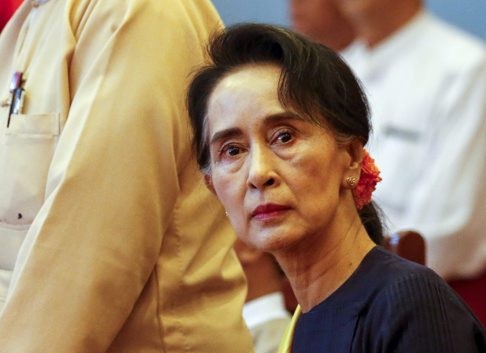Myanmar opens first stock exchange but will have to wait until next year to start trading
New bourse could help the newly elected government, run by Aung San Suu Kyi and her NLD party, tackle hulking state-owned enterprises.
PUBLISHED : Wednesday, 09 December, 2015, 8:47pm
UPDATED : Wednesday, 09 December, 2015, 8:48pm
Agence France-Presse in Yangon

The opening ceremony of the Yangon Stock Exchange in Yangon. Photo: Xinhua
Myanmar officially launched its first modern bourse on Wednesday, but without a single stock to trade until next year, as the nation’s latest drive for economic revitalisation struggles to take flight.
Aung San Suu Kyi’s pro-democracy party swept elections last month, boosting confidence in the former junta-run nation's reforms, which have also nudged open the door to a once reclusive economy.
The Yangon Stock Exchange (YSX) was launched with the clanging of a gleaming ceremonial bell on Wednesday, marking an ambitious new stage in the nation’s efforts to ignite investment.
“We have a dream and this morning this dream has come true,” said Maung Maung Thein, head of Myanmar’s Securities and Exchange Commission, in an opening speech at the newly restored colonial-era building housing the exchange.
He said six Myanmar firms had been approved to list on a market tipped to be “instrumental to the growth of our economy”.
Those companies, which include the Japan-backed Thilawa Special Economic Zone and First Myanmar Investment run by Myanmar tycoon Serge Pun, “will be going into the annals of our history”, he added. But they will have to wait until February or March to begin trading.
“We are already many years late so it is not a problem to take a little longer,” he said after the launch, referring to the latest in a string of delays to beset the bourse.
The lack of active trading did not stop officials from proudly screening a mock-up of the stock exchange for guests on Wednesday.
Vice-President Nyan Tun told reporters that while the stock market would start out with only Myanmar firms, authorities hope it will become a regional player. But analysts say the country has a long way to go to build trust in its new market.
Mixo Das, of Nomura in Singapore, said the bourse would need a track record of good governance.
“I think the stock exchange in Myanmar will be much like the ones in Laos or Cambodia – more as a source of national pride and learning experience for the first several years,” he added.
Myanmar languished under the yoke of the military for around half a century. A once-buoyant economy was trammelled by state mismanagement, isolation and heavy sanctions imposed by Western nations for major human rights abuses.
It still faces steep challenges including rampant corruption, a murky legal system, dismal infrastructure and a widespread distrust of the banking system. But reforms since 2011 have raised hopes of an economic renaissance in the nation of 51 million people, which has rich natural resources and a strategic location between India, China and Southeast Asia.

NLD leader Aung San Suu Kyi. Photo: EPA
Myanmar’s bourse has been decades in the making. In 1996, Japanese firm Daiwa Securities and a state bank set up the Myanmar Securities Exchange Centre, but this allowed over-the-counter sales of shares in just two firms, a Myanmar timber company and a bank.
Rajiv Biswas, of IHS Global Insight, said it will be an important tool in developing the country’s financial system.
It could also help a new government, run by Suu Kyi and her party, tackle hulking state-owned enterprises, enabling capital raising for partial privatisations, he said.
Official media has said state-owned Myanma Economic Bank will own a controlling 51 per cent stake in YSX, with the remainder divided between Japanese partners the Japan Exchange Group and Daiwa Institute of Research, the research arm of Daiwa Securities Group. Local businesses have welcomed the new bourse.
“I am very optimistic about this reform because it could help Myanmar's economy grow bigger,” said Sai Sam Htun whose Loi Hein Group has applied for an underwriting licence.
